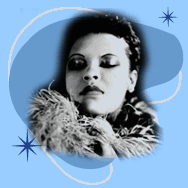

Billie Holiday had a tough childhood.
Billie Holiday (1915-1959) was born in Baltimore, Maryland. She was placed in the care of her grandparents and an older cousin while her mother left to work in New York City. Her father, a banjo and guitar player, left his family to tour with a jazz band. Billie's relatives abused and neglected her. With little help from the grown-ups around her, Billie had to start working. She ran errands and cleaned apartments for people in her neighborhood.
Billie moved to New York.
Billie went to New York to live with her mother-but her mother had other plans. She moved Billie to a room in an apartment house where she was once again left to fend for herself. Billie ran into some trouble with the law and had to spend a few months in jail.
When Billie was released she knew she had to earn more money to survive and she started singing in clubs. When she was fifteen, she had to sing the same songs over and over again for customers. To keep the music interesting, Billie changed her voice and timing slightly while repeating the same lyrics. She claimed that she never liked to sing a song the same way twice. She loved the styles of Louis Armstrong and the great blues singer Bessie Smith, and learned to use her voice like an instrument, a skill that helped her attract the attention of talented jazz bandleaders.
Billie tried to be a dancer.
Billie tried to be a dancer in a Harlem nightclub but was turned down by the owner. After the audition, she sang a blues tune while she was getting ready to leave. The nightclub owner heard her singing and he hired her to sing for the club. This was a step in the right direction for Billie because many musicians wanted to perform in Harlem's hot jazz scene.
Billie became a jazz singer.
Billie got a record deal with Vocalion Records. In 1935, she began making a series of recordings with Teddy Wilson, a talented jazz pianist. She made records with him and other musicians over the next six years and recorded many popular songs. Other singers may have had a wider range and stronger projection than Billie, but her combination of an instrumental approach and her special feeling made her unique. Her artistry was in her timing and soulful performances.
Billie went on the road.
After making a name for herself, Billie toured with the Count Basie orchestra for a year. Then in 1938, she went on the road with Artie Shaw's all-white band. While touring in the south, Billie would have to stay on the bus while the band went to whites-only restaurants. These times were hard on Billie and she stopped touring to begin a solo career.
Billie managed to make beautiful music despite her personal struggles.
Although her early recordings are full of life and joy, by her 30's Billie suffered from depression and mood swings. Her personal problems worsened when she became addicted to drugs and alcohol. As Billie tried to recover from her addiction, she had a comeback period during the mid-1950s. She performed at Carnegie Hall (a legendary, New York concert hall) and toured in Europe. She always made beautiful music and made many great recordings in spite of her physical and emotional problems. Sadly, Billie was never able to overcome her drug addiction. Her health began to fail and Billie died when she was 45 years old.
Photo courtesy of Frank Driggs













